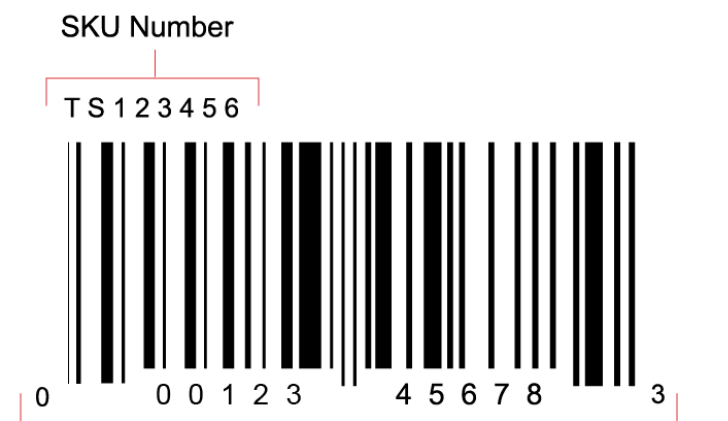At their core, SKU numbers are unique codes made up of letters and numbers that retailers create themselves to help organize their inventory process.
Key Takeaways
- SKU numbers are unique codes used by retailers to organize their inventory and track products.
- SKUs play a crucial role in efficient inventory management, reducing errors and increasing operational efficiency.
- Using SKU numbers helps retailers accurately track sales data, forecast demand, capitalize on high – profit products, recommend relevant items to customers, and increase customer satisfaction.
What is a SKU Number?
A SKU number, also known as a stock keeping unit, is an alphanumeric code used to uniquely identify and track products in inventory management.
Definition of SKU
An SKU, which stands for Stock Keeping Unit, is a unique alphanumeric code assigned by retailers to every product in their inventory. It’s designed to identify and track items helping businesses to effectively manage stock levels and sales data.
This scannable product ID plays an instrumental role in easing the inventory management process, reducing potential errors and enhancing operational efficiency. The importance of SKUs extends beyond simple inventory tracking; they also allow retailers to gauge product performance accurately, distinguishes between popular items and those that sell slowly allowing them to make strategic stocking decisions based on obtained data.

Purpose of SKUs
SKU numbers serve as the backbone of inventory management for retailers and eCommerce businesses. This unique alphanumeric code gives each product in an inventory a distinct identity, allowing it to be easily tracked and managed.
SKU numbers facilitate the automation of inventory tasks, reducing errors and increasing efficiency. They are essential tools for monitoring stock levels and sales data, aiding in vital business decisions about reordering products or addressing slow-moving items.
With easy-to-scan SKUs on product labels, warehouse operations become swift and error-free. So you see how crucial SKU numbers’ role is not only in identifying each item but also providing valuable insights into your retail industry’s overall performance?.
How to Create and Use SKUs
To create a SKU, retailers can assign a unique alphanumeric code to each product based on its physical attributes such as size, color, and brand. They should also consider the inventory size and type when generating SKUs.
Benefits of SKUs
Using SKU numbers offers several advantages for retailers, particularly in inventory management and sales data analysis. Here are some noteworthy benefits:
| Benefit | Description |
|---|---|
| Efficient Inventory Management | SKUs help businesses automate their inventory management processes, thanks to the unique alphanumeric codes assigned to each product. |
| Accurate Tracking | With SKU numbers, businesses can precisely track product performance, enabling them to identify popular and slow-selling items. |
| Data-driven Decision Making | The detailed sales and inventory data provided by SKU numbers enable retailers to make informed choices about restocking and overall product management. |
| Streamlining Operations | Utilizing SKU numbers significantly reduces errors in retail operations, leading to improved efficiency. |
| Easy Product Identification | SKU numbers are scannable codes easily read by barcode scanners, facilitating quick and effective product identification in an extensive inventory system. |
| Improved Customer Satisfaction | By tracking favorite items through SKUs, retailers can provide personalized recommendations to customers, enhancing their shopping experience. |

How to Create a SKU Nomenclature
Creating an SKU nomenclature is an important step in effectively managing your inventory. Follow these guidelines to create a clear and organized system:
| Guideline | Description |
|---|---|
| Start with product categories | Divide your products into logical categories based on their characteristics, such as size, color, brand, or type. |
| Use numbers or letters for categories | Assign a unique number or letter to each category to make it easier to identify and differentiate them. |
| Include subcategories if needed | If your products within a category have further variations, create subcategories using additional numbers or letters. |
| Add specific details | Incorporate specific details about the product, such as its size, color, or material, into the SKU code. These details can help you quickly identify and locate items in your inventory. |
| Keep it concise | Avoid using long or complex codes that can be difficult to remember or input accurately. Aim for simplicity while still capturing all necessary information. |
| Avoid special characters | Stick to alphanumeric characters (letters and numbers) when creating SKUs to ensure compatibility with various systems and platforms. |
| Order information logically | Structure your SKU codes so that they flow logically from general information to more specific details. This will help you quickly navigate and search through your inventory. |
| Consider scalability | As your business grows, consider how your SKU system will accommodate new products without becoming overly complicated. Plan for future expansion by leaving room for additional categories or subcategories in your nomenclature. |
Advantages of SKUs in Retail
SKUs in retail offer a range of advantages, including accurate inventory tracking, sales forecasting, capitalizing on high-profit products, recommending relevant items to customers, and ultimately increasing customer satisfaction.
Accurately track inventory
Using SKU numbers allows retailers to accurately track their inventory. Each product is assigned a unique alphanumeric code, making it easy to identify and distinguish between different items.
By scanning the SKU codes, businesses can quickly update stock levels, monitor sales data, and make informed decisions about restocking and product management. This ensures that retailers always have a clear picture of their inventory levels and helps them avoid stockouts or overstocking situations.
With accurate inventory tracking through SKU numbers, businesses can streamline their operations, reduce errors, and improve overall efficiency in managing their inventory.
Forecast sales
To effectively manage inventory and make informed business decisions, it is crucial for retailers to forecast sales accurately. By analyzing historical sales data and market trends, SKU numbers can help predict future demand for products.
This enables retailers to anticipate which items will be popular or slow-selling, allowing them to adjust their inventory levels accordingly. With the ability to forecast sales using SKU numbers, retailers can optimize their product offerings, reduce stockouts or overstock situations, and ultimately improve their overall profitability.
Capitalize on high-profit products
By using SKU numbers, retailers can easily identify and track their high-profit products. These unique alphanumeric codes allow businesses to quickly access sales data and inventory levels for each specific item.
Having this valuable information at their fingertips enables retailers to make informed decisions about restocking and product management. With the ability to capitalize on high-profit products, retailers can maximize their earnings and drive business growth.

Recommend relevant products
As a retailer, utilizing SKU numbers can help you recommend relevant products to your customers. By tracking sales and inventory levels through SKU numbers, you can identify which items are popular and align them with customer preferences.
This data-driven approach allows you to understand your customers’ needs better and offer them the products they are most likely to be interested in. With SKU numbers as unique identifiers for each product, you can streamline your inventory management processes and improve overall efficiency in recommending relevant products.
Furthermore, by analyzing sales trends based on SKU numbers, you can anticipate customer demands and tailor your product recommendations accordingly. This proactive approach not only helps boost sales but also enhances customer satisfaction by ensuring that they find the right products easily.
With the valuable insights provided by SKU numbers, you can refine your product offerings and ultimately provide a personalized shopping experience for your customers.
In summary, leveraging SKU numbers enables retailers to recommend relevant products efficiently by tracking sales data, understanding customer preferences, and anticipating demand based on historical trends.
Increase customer satisfaction
SKU numbers play a crucial role in increasing customer satisfaction. By accurately tracking inventory levels and sales data, retailers can ensure that popular products are always in stock and readily available for customers.
This reduces the likelihood of out-of-stock situations, which often leads to frustration and disappointment for shoppers. Additionally, with the help of SKU numbers, retailers can quickly identify slow-selling items and take appropriate actions to improve their product offerings.
This proactive approach to inventory management ensures that customers have access to a wide range of products they desire, resulting in higher customer satisfaction overall.
Differences Between SKU Numbers and UPC Codes
SKU numbers and UPC codes serve different purposes in retail.

Definitions of SKU and UPC
An SKU, or stock keeping unit, is a unique alphanumeric code used by retailers to identify and track their products. It serves as a product ID that helps businesses differentiate between items in their inventory based on physical attributes such as size, color, and brand.
On the other hand, a UPC, or universal product code, is a barcode that represents the SKU number in a scannable format. While both are used for product identification purposes, an SKU is specific to each retailer’s inventory management system, while the UPC is standardized across all retailers.
Its importance lies in providing accurate tracking of sales data and inventory levels for effective decision-making in retail operations.



